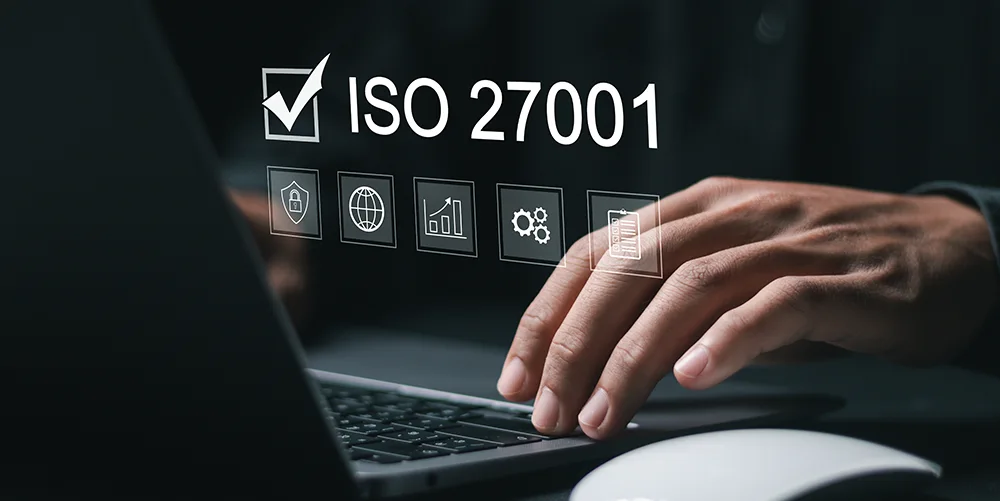Harnessing ISO/IEC 42001: The Strategic Advantage for AI-Driven Business

Posted on August 23, 2024 by Rob May
Welcome to our technical blog, where we share insights and expertise on a variety of technical topics. This post is part of our ongoing series, specifically aimed at professionals in technical roles, providing in-depth information and practical tips.
As businesses across the UK increasingly integrate artificial intelligence (AI) into their operations, ensuring these systems are reliable, secure, and ethically sound becomes paramount. As a response to that we now have ISO/IEC 42001, a global standard designed to guide organisations in implementing and managing AI systems. This standard represents a critical framework for enterprises aiming to leverage AI responsibly and effectively. In this article, we delve into the significance of ISO/IEC 42001 from an AI perspective, outlining its benefits and strategic importance for C-suite executives.
Understanding ISO/IEC 42001
ISO/IEC 42001 is a comprehensive standard developed by the International Organisation for Standardisation (ISO) and the International Electrotechnical Commission (IEC). It provides guidelines for AI management systems, focusing on aspects such as governance, risk management, ethics, and security. The standard aims to create a robust foundation for AI deployment, ensuring these technologies align with an organisation’s strategic objectives while mitigating potential risks.
The AI Landscape: Challenges and Opportunities
AI presents unparalleled opportunities for innovation and efficiency. From automating routine tasks to uncovering valuable insights through data analysis, AI can revolutionise various business functions. However, the integration of AI also poses significant challenges, including:
- Ethical Concerns: Ensuring AI systems operate without bias and respect user privacy.
- Security Risks: Protecting AI systems from cyber threats and ensuring data integrity.
- Compliance: Adhering to regulatory requirements and industry standards.
- Transparency: Maintaining clarity in AI decision-making processes to foster trust.
ISO/IEC 42001 addresses these challenges by providing a structured approach to AI governance, emphasising the importance of ethical considerations, security measures, and compliance.
Key Benefits of ISO/IEC 42001 for AI-Driven Enterprises
Enhanced Governance and Accountability
Implementing ISO/IEC 42001 ensures that AI initiatives are aligned with organisational goals and ethical standards. This fosters a culture of accountability, where AI projects are monitored and evaluated rigorously.
Risk Management
The standard emphasises a proactive approach to risk management, helping businesses identify and mitigate potential threats before they impact operations. This is crucial in maintaining the integrity and reliability of AI systems.
Regulatory Compliance
Adhering to ISO/IEC 42001 positions organisations favourably with regulators. The standard’s guidelines align with many international regulations, making it easier for businesses to demonstrate compliance and avoid legal pitfalls.
Trust and Transparency
ISO/IEC 42001 promotes transparency in AI operations, ensuring that decision-making processes are understandable and justifiable. This transparency is vital in building trust with stakeholders, including customers, partners, and regulatory bodies.
Competitive Advantage
Organisations that adopt ISO/IEC 42001 can differentiate themselves in the market. Demonstrating a commitment to ethical and secure AI practices enhances brand reputation and can be a decisive factor for clients and investors.
Implementing ISO/IEC 42001: Strategic Considerations
For forward thinking business executives, the implementation of ISO/IEC 42001 should be viewed as a strategic initiative that requires cross-functional collaboration. Here are key considerations:
- Leadership Commitment: Top management must demonstrate a commitment to AI governance and allocate resources effectively to support ISO/IEC 42001 implementation.
- Stakeholder Engagement: Engaging stakeholders, including employees, customers, and partners, is crucial to understand their concerns and expectations regarding AI.
- Continuous Improvement: ISO/IEC 42001 encourages ongoing assessment and improvement of AI systems. Establishing metrics and feedback loops is essential for continuous optimisation.
- Training and Education: Investing in training programs ensures that employees understand the principles of ISO/IEC 42001 and can contribute to its effective implementation.
Next Steps
ISO/IEC 42001 represents a strategic tool for businesses looking to harness the full potential of AI while addressing its inherent risks. For proactive, ethical UK-based enterprises, adopting this standard can pave the way for innovative, secure, and ethically sound AI applications. By integrating ISO/IEC 42001 into their AI strategy, businesses can not only enhance their operational efficiency but also build a strong foundation of trust and compliance that will serve them well in the dynamic landscape of AI.
Embrace ISO/IEC 42001 and lead your organisation into a future where AI is a force for good, driving growth and innovation with integrity and transparency.
If you have questions about this or any other security certifications, please talk to one of our specialist compliance advisers at ramsac.

Take the ramsac AI Readiness Assessment
Our AI readiness assessment looks at what your organisation needs to implement AI, and provides you with clear guidance and support to make it happen.







